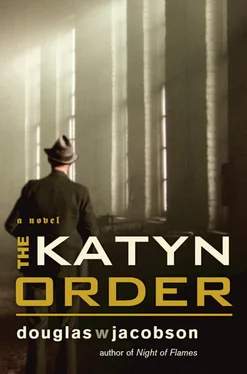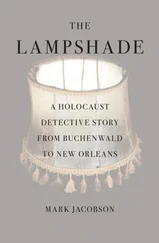Adam shifted in his chair. He wondered about the code name “Provider,” trying to recall if he’d heard it before. He thought that he had, but where, when? A dozen images flitted through his mind like random puzzle pieces, but nothing clicked.
“I didn’t discuss any of this with you when you arrived here in ’39,” Whitehall said, “because your uncle’s involvement in the AK was known to only a select few within the Polish Government. At the time, you didn’t need to know. Now you do.”
“But what’s all this got to do with a war crimes investigation—?”
Whitehall held up a hand, stopping him. “Here’s something else we know.” He paused for a moment, glancing briefly at another piece of paper. “Last month the government of the Soviet Union invited sixteen of the surviving commanders of the AK to a peace conference in Moscow—then arrested them.”
Adam sat silently. He had heard about the arrests.
“Do you know what became of them?” Whitehall asked.
“I heard they’re locked up in Lubyanka Prison. The whole thing was a sham, a trick to destroy the remaining leadership of the AK.”
Whitehall looked at Adam for a long silent moment, then leaned across the desk. “You’re quite right. The leaders of the AK are now in Russian hands, all of them, the last roadblock in the takeover of Poland by the Russians. All of them, that is, except Ludwik Banach.”
“Banach? My uncle was sent to Sachsenhausen six years ago, Colonel. He’s probably…” Adam’s voice trailed off as he remembered the last time he’d seen his uncle. He was dressed in his best suit and heading off to a “seminar” at the university. He never returned. But that night, before he left, he’d given Whitehall’s name and telephone number to Adam.
“I know how much he meant to you, Adam. And it’s quite possible he didn’t survive. But, then again, perhaps he did. You saw the report, there were survivors.”
Whitehall pushed back from his desk and stood up, a clear signal the meeting was over, the issue decided. “The Polish Government-in-Exile wants a representative on that investigation team,” he said matter-of-factly. “Ludwik Banach is important to them. He’s an icon, symbol of Polish independence and all that, especially now, since the arrest of the other AK leaders. They want to know what happened to him.”
Whitehall stepped around the desk and laid a big hand on Adam’s shoulder. “Sleep on it. We’ll meet tomorrow with one of my staffers, chap named Donavan. He’ll give you the run-down on Sachsenhausen.” Then he cocked his head and looked closely at the thin scar on the side of Adam’s face and his mangled ear. “Nasty wound. That happen in Warsaw?”
Adam nodded.
“Well, could’ve been worse. But we should get those glasses of yours fixed while you’re here.”
11 MAY
ADAM DIDN’T GET MUCH SLEEP. He had dinner in his room, drank half a bottle of wine and smoked cigarettes—real ones from a package, instead of the limp and soggy, hand-rolled ones he’d put up with for years, filled with as much sawdust as tobacco. He lay on the bed and stared at the ceiling for most of the night, thinking about Ludwik Banach, the man who had been like a father to him during the first eleven years of his life, the man who had taken him in a second time, years later, and become his teacher and mentor. The man who had given him a family.
And then, in September of 1939, it was all abruptly and brutally torn away. His uncle’s arrest had been part of a sonderaktion, the beginning of the Nazi plan to strip Poland of its professors and teachers, its lawyers and political leaders. At least that’s what Adam had always thought.
But the conversation with Whitehall brought back forgotten details, memories of his uncle that didn’t quite fit the picture Adam had constructed of him. They were just fragments, a few bits and pieces, things that Banach seemed to know when no one else did.
He recalled a conversation in August of ’39 when Banach speculated about the secret treaty between Germany and Russia—a week before it happened. Then, just two days into the war, Banach knew before anyone else that Krakow would not be defended. And, two weeks later, he wasn’t surprised when the Russians attacked.
An “information channel,” Whitehall had called it. And Ludwik Banach, one of the original leaders of the AK, had set it up. That’s why he was arrested. Adam thought again about his uncle’s code name, “the Provider,” almost certain he’d heard it before… but then again…
He lit another cigarette, watching the smoke curl its way toward the ceiling, remembering the moment when he learned of his uncle’s arrest and the cold, ice-blue eyes of the SS officer who delivered the news. Though seething with rage, Adam hadn’t had the opportunity to kill that particular officer at that moment. But in all the years since then he’d sought his vengeance through sabotage and assassinations, forcing every emotion from his heart except pure hatred for his uncle’s murderers. It drove him, it kept him going, and he’d shut out his past.
Until Warsaw.
Until Natalia… a ray of light in a dark world.
But at the one moment when it might have mattered, he had been incapable of doing anything. It was as though his feet were buried in the same cement that had hardened his heart. At the moment when he stood watching from the window of the hospital in Raczynski Palace, he had desperately wanted to run to her and embrace her. But he was immobilized by his fear, his smoldering anger… his guilt.
And then she was gone.
Adam woke at dawn, after finally drifting off for a few restless hours. His back ached and his mind was a murky haze. Coffee helped. The English breakfast—with real eggs and real bacon—helped even more. By nine o’clock, when the taciturn chauffer arrived, he was ready to face the day, though he was still uncertain what good would come from a tour of a German concentration camp.
Whitehall’s staffer, Tom Donavan, was a tall, lanky man in shirtsleeves, sporting a colorful bow tie. He slid into a chair in Whitehall’s office with a file folder on his lap and sat quietly, waiting for instructions.
“Very well, then,” Whitehall said, “shall we get started?” He glanced at Adam. “I realize that some of this may be a bit difficult for you, old chap, but God knows, you’ve undoubtedly seen worse.”
Whitehall motioned to Donavan, who opened the folder and removed a sheet of paper. He studied it for a moment before he began. “The Sachsenhausen camp was constructed in 1938 at Oranienburg, just north of Berlin. Before the war most of the inmates were German communists and other political dissidents. After the invasion of Poland the camp was expanded, and the number of inmates grew significantly—Jews, trade union leaders, political prisoners from Germany, Czechoslovakia and, of course, Poland.” He looked up from the paper. “We estimate the total number of prisoners sent to Sachsenhausen at more than a quarter million.”
“The survivors?” Adam asked.
Donavan laid the sheet of paper on the edge of Whitehall’s desk. “We understand there were approximately three thousand survivors when the Russians liberated the camp. We don’t have any names, of course, but the Russians will have the records.”
“What happened to them?”
Donavan shook his head. “I’m afraid we don’t know. The SS guards apparently ran off before the Russians got there, and some of the survivors simply walked away. Those that were left were mostly the ones too sick or weak to leave.”
Adam turned to Whitehall. “What happens next?”
Donavan gathered his papers and left the room.
Читать дальше












